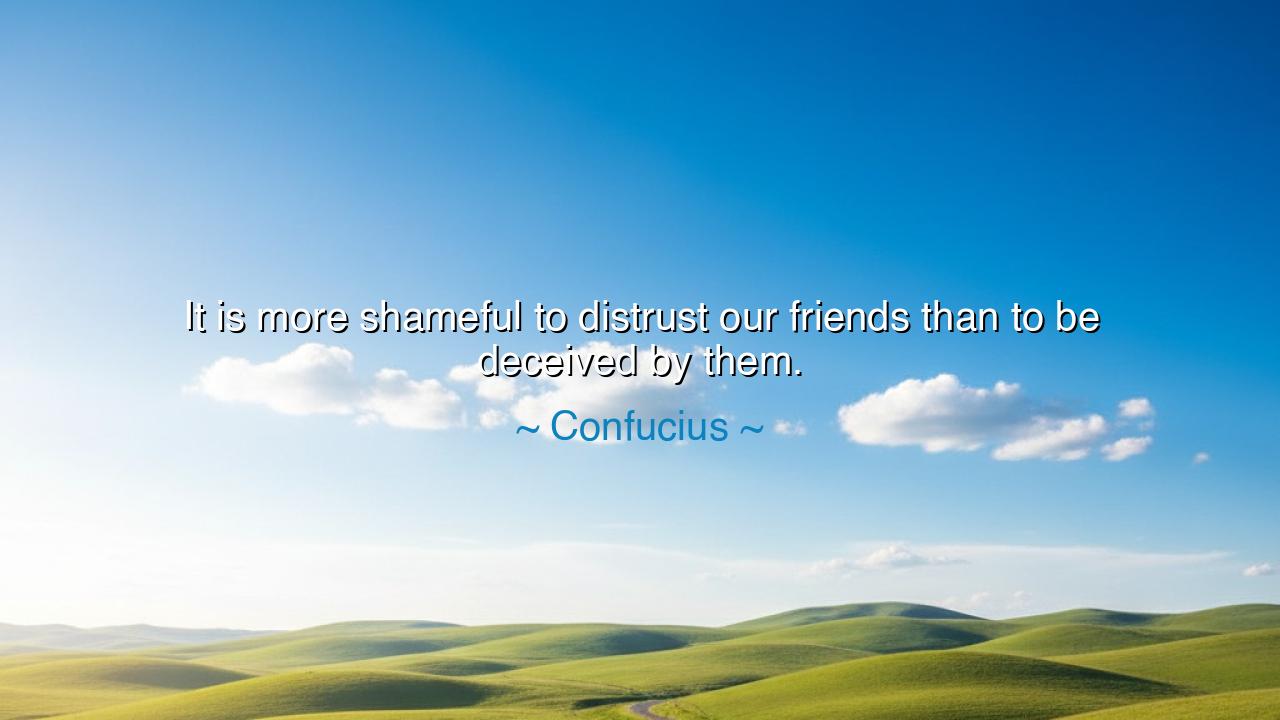
It is more shameful to distrust our friends than to be deceived






Confucius, the sage of harmony and virtue, once declared: “It is more shameful to distrust our friends than to be deceived by them.” In these words lies a truth as gentle as it is profound — that trust, though it may wound us at times, is the very foundation upon which all noble friendship and human goodness stand. To distrust those who have earned our faith is to weaken the thread that binds hearts together; it is to doubt not only another’s honor, but our own. The Master, who sought always to bring balance to the soul and order to society, teaches that it is better to be deceived once by faith misplaced than to live forever in suspicion, for mistrust poisons the spirit more deeply than betrayal ever could.
The origin of this teaching lies in Confucius’s lifelong quest for virtue and moral clarity. He lived in an age when kingdoms clashed, loyalty wavered, and deceit was common among those who sought power. Yet amid such uncertainty, he held fast to the belief that a man’s worth is measured not by how cunningly he guards his heart, but by how courageously he opens it. To trust, he taught, is an act of moral strength; to distrust without cause is an act of fear. Thus, when he says that it is “more shameful” to doubt a friend, he speaks not merely of social courtesy, but of the soul’s integrity — for suspicion reveals a spirit that has forgotten the beauty of faith.
When we trust, we affirm the goodness of the world. Every friendship, every bond, rests upon this silent covenant: I believe in you. And to believe in another is to plant a seed of virtue that grows in both hearts. But when we choose distrust, we sever that root; we retreat into the barren soil of self-protection. Confucius reminds us that even if trust is betrayed, the greater loss belongs not to the deceived, but to the deceiver, whose soul has turned from light. The one who continues to trust, even after pain, preserves purity of heart — and that is a treasure no deceit can destroy.
Consider, then, the story of Caesar and Brutus from the ancient world. Julius Caesar, the conqueror of empires, placed his faith in Brutus, whom he loved as a son. When betrayal came, it was with Brutus’s dagger that Caesar fell. Yet history remembers not Caesar’s trust as weakness, but as nobility — for he had the heart to believe in friendship even in a world of treachery. Brutus, on the other hand, lives forever as the name for betrayal. The wound of deceit fades with time; the stain of mistrust endures through generations. Confucius would have said that though Caesar was deceived, he was not dishonored — for to have trusted was to remain faithful to his own virtue.
This is the essence of moral courage — to risk faith even in a world of falsehood. For mistrust is a fortress that imprisons both the mind and the heart. Those who suspect everyone become lonely rulers of a crumbling kingdom within themselves. They live untouched by betrayal, perhaps, but also untouched by love. Confucius teaches that it is better to suffer the sting of deceit than to seal one’s heart against the warmth of loyalty. For friendship without trust is like a lamp without oil — it cannot burn, it cannot illuminate the path ahead.
Yet the Master’s wisdom is not blind. He does not command us to trust foolishly, but to guard the balance between discernment and doubt. Trust must not be given carelessly, but once earned, it must be honored. To revoke it without cause is to bring shame upon ourselves, for it reveals that our hearts are ruled by fear, not by virtue. True strength lies not in building walls, but in standing vulnerable and unafraid within the open field of human connection. The wise person knows that betrayal may come — yet chooses to live by trust nonetheless, for to live otherwise is not to live fully at all.
So, my children of the inner way, let this truth be engraved upon your hearts: trust is the root of friendship, and friendship is the root of humanity. If you are deceived, forgive and learn; but never let deception make you bitter. To forgive is to remain pure; to distrust without cause is to fall into shadow. Cultivate discernment, but keep faith alive. Speak truth to your friends, believe in their better nature, and when doubt arises, confront it with courage, not suspicion.
For as Confucius teaches, to trust and be deceived is the pain of a single moment, but to distrust and live in fear is the slow death of the soul. Better to walk the path of openness, where wounds may heal, than the path of suspicion, where nothing ever grows. Trust, then — not because the world is flawless, but because faith itself is the mark of the wise and the noble-hearted. In this, as in all things, the Master’s voice still calls across the centuries: “Hold fast to virtue. Trust your friends. Even if the world betrays you, let your heart remain true.”






AAdministratorAdministrator
Welcome, honored guests. Please leave a comment, we will respond soon